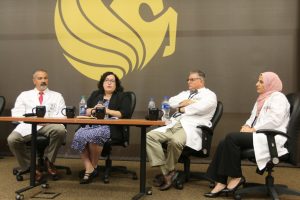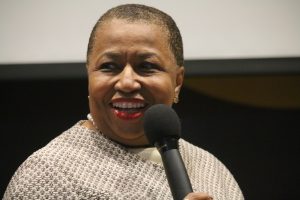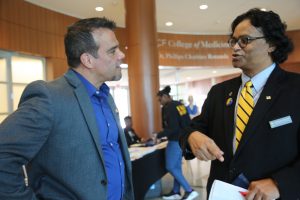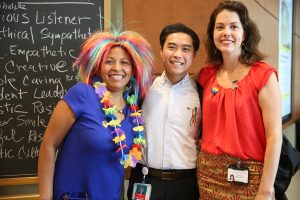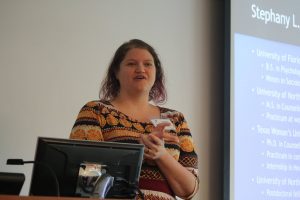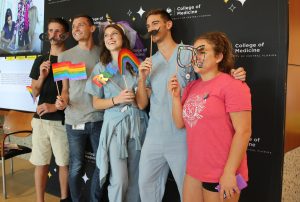
As a young physician, Dr. Sergio Salazar began his practice in rural Tennessee. There, he met a patient with heart failure who refused to be treated by a Hispanic physician.
“He was breathing heavily and was apparently in distress, but once he saw my (Spanish) name he refused to let me touch him,” Dr. Salazar said. “I told him I was the only physician available as all the other doctors were busy attending to other patients. He said ‘I would rather die than let you touch me.’”
Dr. Salazar, now assistant dean for students and an internist at UCF Health, shared his story during the College of Medicine’s diversity week October 16-19. He and other faculty physicians presented “Tolerance and Communication,” which explored ways physicians can cope with intolerance from patients, due to differences in religion, race or gender.
The week, sponsored by the Office for Diversity and Inclusion, featured discussions on ways doctors can better engage, communicate and provide care to diverse patients.
The faculty panel discussion featured Dr. Salazar, Dr. Caridad Hernandez, Dr. John Tramont, a male OB-GYN specialist at UCF Health and Dr. Shazia Bég, a rheumatologist at the practice who wears a hijab in recognition of her Muslim faith. All said they had experienced intolerant and sometimes hostile patients. All had suggestions for ways to address such feelings professionally.
“If you have openness, listen to them, give them space and assure them that you have their best interest at heart, that goes a long way,” Dr. Salazar said. “Everybody realizes after a while that what makes us different is very minimal compared to what makes us all the same.”
Dr. Beg said during her fellowship she cared for a soldier at a veteran’s hospital who become hostile and refused to let her treat him. Other patients, she said, develop trust after seeing her empathetic care. She said she has recently counseled UCF medical students who have felt the need to remove their hijabs because of hostile treatment by patients.
“Give (patients) them respect and they will give you back respect most times,” she advised. “Spend the time to talk to them about their families and non-medical issues. Also, being competent in your field goes a long way.”
Keynote Luncheon
Carol Moseley Braun, the first African-American woman elected to the U.S. Senate, opened Diversity Week speaking on the challenges of racial and gender equality in healthcare and as a leader.
She encouraged diverse medical students to remain true to themselves.
“I think being your authentic self is the most important thing you can do. You go into the room not just to take up a seat. You have a responsibility to be your authentic self to share your perspective, to share what it is you have and what you have to give, and that is the value of diversity.”
Health Disparities for Gender Minorities
On Tuesday, Dr. Stephany Mahaffey, a licensed psychologist at Authentic Life Transitions, discussed health disparities experienced by transgender patients.
Dr. Mahaffey said healthcare providers need to practice “radical patience” in building trust with gender minorities, noting that 40 percent of these patients have attempted suicide at least once. “I hope this statistic jars medical professionals to understand what we’re working with when we’re misgendering a client, or we have the opportunity to be the first person that an individual comes out to,” she said.
Practicing With Pride Barbecue
The LGBTQ student group organized the first annual Practicing with Pride Barbecue to bring awareness to the need for more culturally sensitive care. Dr. Edwin DeJesus, medical director for the Orlando Immunology Center, was the keynote speaker and told students they must be sensitive to all patients – including those that are different from a student’s own background, culture and experience.
“We have to individualize each patient to be able to treat them with respect,” he said. “As a medical practitioner, we need to identify their medical and clinical needs, and how we are going to address that in a respectful way so that we can form a bond.”
At the conclusion of the week’s events, Dr. Saleh Rahman, the College of Medicine’s new interim assistant dean for diversity and inclusion, said the events helped to raise awareness of diversity issues.
“Diversity Week is a great place to start these conversations, so we learn from each other, reach a greater understanding, learn the fallacies of our stereotypes and learn how to be better caregivers to our patients, our families and our society.”
